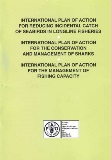Publications
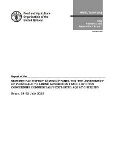
Report of the Seventh FAO Expert Advisory Panel for the Assessment of the Proposals to Amend Appendices I and II of CITES Concerning Commercially-Exploited Aquatic Species
2022
The 7th FAO Expert Advisory Panel for the Assessment of Proposals to Amend Appendices I and II of CITES Concerning Commercially Exploited Aquatic Species was convened in response to the agreement by the 25th Session of the FAO Committee on Fisheries (COFI) on the Terms of Reference for an expert advisory panel for assessment of proposals to the Convention on International Trade in Endangered Species of Wild Fauna and Flora (CITES.
-process.tmb-th600x450.jpg?Culture=en&sfvrsn=d70eacdb_1)
FAO and marine biological diversity beyond national jurisdiction (BBNJ) process
2022
This document presents information on the work of FAO that is relevant to the BBNJ process, including ongoing processes and initiatives, and lessons learned, which may be informative and useful for BBNJ Delegates and others. This information may also be a useful indication of areas where FAO may assist Member Nations in the implementation of the future international legally binding instrument (ILBI).
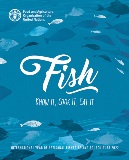
Fish: Know it, cook it, eat it
2022
Fish is crucial for global food security, providing vital protein for billions. It supports sustainable food systems and diverse culinary traditions worldwide. Learn about nutrition, avoid fish fraud, and understand environmental challenges through engaging content. Enjoy recipes from renowned chefs promoting zero waste and biodiversity.
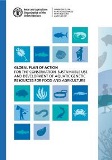
Global Plan of Action for the Conservation, Sustainable Use and Development of Aquatic Genetic Resources for Food and Agriculture
2022
This Global Plan of Action for the Conservation, Sustainable Use and Development of Aquatic Genetic Resources for Food and Agriculture (GPA) was developed by FAO at the request of the members of the Commission on Genetic Resources for Food and Agriculture in response to the needs and challenges identified in the first global assessment of the status of Aquatic Genetic Resources for Food and Agriculture (AqGR).
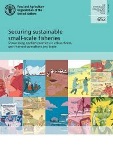
Securing sustainable small-scale fisheries – Showcasing applied practices in value chains, post-harvest operations and trade
2020
This document includes nine studies showcasing applied practices and successful initiatives in support of enhancing small-scale fisheries value chains, post-harvest operations and trade, based on the recommendations contained in the SSF Guidelines.
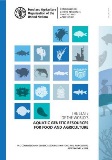
The State of the World's Aquatic Genetic Resources for Food and Agriculture
2019
The conservation, sustainable use and development of aquatic genetic resources (AqGR) is critical to the future supply of fish. The State of the World’s Aquatic Genetic Resources for Food and Agriculture is the first ever global assessment of these resources, with the scope of this first Report being limited to cultured AqGR and their wild relatives, within national jurisdiction.
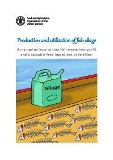
Production and utilization of fish silage
2018
The processing of fish leads to a significant removal of parts of the fish, such as heads, bones, guts, etc., these parts can represent between 30-70% of the fish. The fish silage process transforms fish waste into a liquid mix of hydrolysed proteins, lipids, minerals and other nutrients, easily digestible by both terrestrial and aquatic animals. It can also serve as an excellent fertilizer.
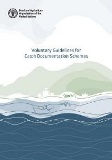
Voluntary Guidelines for Catch Documentation Schemes
2017
“Catch Documentation Scheme” (CDS), means a system with the primary purpose of helping determine throughout the supply chain whether fish originate from catches taken consistent with applicable national, regional and international conservation and management measures, established in accordance with relevant international obligations.
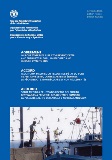
Agreement on Port State Measures to Prevent, Deter and Eliminate Illegal, Unreported and Unregulated Fishing. Revised Edition
2016
The Agreement on Port State Measures to Prevent, Deter and Eliminate Illegal, Unreported and Unregulated Fishing seeks to prevent, deter and eliminate illegal, unreported and unregulated fishing through the adoption and implementation of effective port State measures as a means of ensuring the long-term conservation and sustainable use of living marine resources.
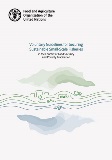
Voluntary Guidelines for Securing Sustainable Small-Scale Fisheries in the Context of Food Security and Poverty Eradication
2015
The Voluntary Guidelines for Securing Sustainable Small-Scale Fisheries in the Context of Food Security and Poverty Eradication (SSF Guidelines) represent the first ever international instrument dedicated to small-scale fisheries. They represent a global consensus on principles and guidance for small-scale fisheries governance and development.
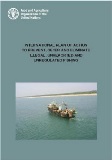
IPOA - International Plan of Action to Prevent, Deter and Eliminate Illegal, Unreported and Unregulated Fishing
2001
The IPOA-IUU is a voluntary instrument that applies to all States and entities and to all fishers. Following the IPOA's introduction, the nature and scope of IUU fishing is addressed. This is followed by the IPOA's objective and principles and the implementation of measures to prevent, deter and eliminate IUU fishing.
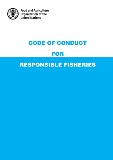
FAO Code of Conduct for Responsible Fisheries
1995
From ancient times, fishing has been a major source of food for humanity and a provider of employment and economic benefits to those engaged in this activity. The wealth of aquatic resources was assumed to be an unlimited gift of nature. However, with increased knowledge and the dynamic development of fisheries after the second world war, this myth has faded in face of the realization that aquatic resources, although renewable, are not infinite and need to be properly managed.

